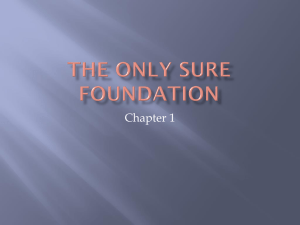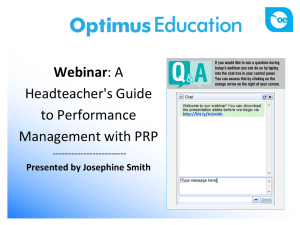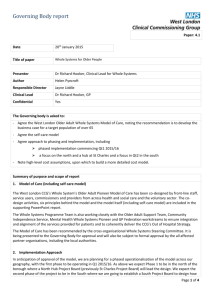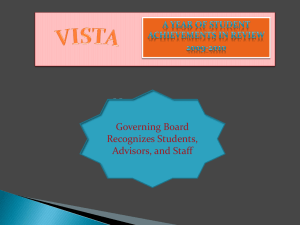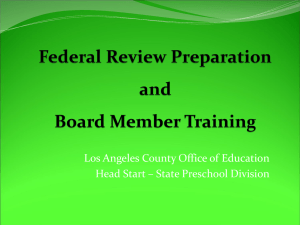PayPolicy14-15 - St. Patrick`s Catholic Primary School, Leicester
advertisement
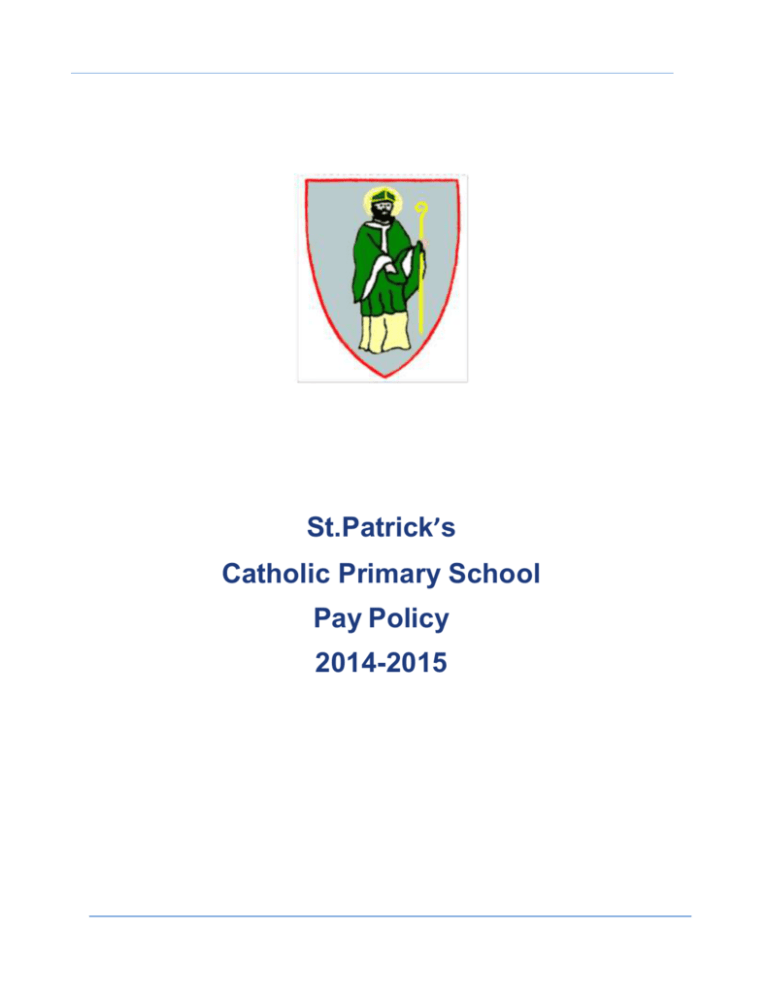
St.Patrick’s Catholic Primary School Pay Policy 2014-2015 Contents 1. INTRODUCTION .......................................................................................................................... 6 2. JOB ROLES AND RESPONSIBILITIES........................................................................................ 8 3. PAY REVIEWS............................................................................................................................. 9 4. RECRUITMENT .............................................................................................................................. 10 i) Teaching Staff....................................................................................................................................................... 10 ii)Support Staff......................................................................................................................................................... 10 5. TEACHING STAFF PAY............................................................................................................. 11 i) Head Teacher ....................................................................................................................................................... 11 ii)Discretionary payments to the Head Teacher ....................................................................................................... 11 xii) iii) Other Leadership Posts ................................................................................................................................. 12 iv) Pay scales for main scale and upper pay spine teachers ............................................................................... 13 v) Basic pay determination on appointment ....................................................................................................... 13 vi) Pay progression based on performance......................................................................................................... 14 vii) Pay Progression within bands ........................................................................................................................ 15 viii) Pay progression between bands .................................................................................................................... 15 ix) Accelerated progression ................................................................................................................................ 15 x) Movement to the Upper Pay Range (Band 3) ................................................................................................ 15 xi) Assimilation to new scales ............................................................................................................................. 17 Leading Practitioners/Other Posts paid above the Classroom Teacher Scale ....................................................... 17 xiii) Unqualified teachers ...................................................................................................................................... 18 6. PART-TIME TEACHERS ............................................................................................................ 20 7. SHORT NOTICE/SUPPLY TEACHERS ..................................................................................... 21 8. ALLOWANCES .......................................................................................................................... 22 i) Teaching and learning responsibility payments ..................................................................................................... 22 ii)Special Educational Needs (SEN) ........................................................................................................................ 22 vii) iii) Acting Allowances .......................................................................................................................................... 23 iv) Recruitment and Retention............................................................................................................................. 23 v) Out of School Learning Activities.................................................................................................................... 24 vi) Continuing Professional Development ........................................................................................................... 24 Activities relating to the provision of initial teacher training as part of the ordinary conduct of the school .............. 25 viii) Additional responsibilities and activities due to or in respect of the provision of services by the Head Teacher relating to the raising of educational standards to one or more additional schools .......................................................... 25 9. SUPPORT STAFF ...................................................................................................................... 26 10. ANNUAL REVIEW ....................................................................................................................... 27 11. GRIEVANCES AND APPEALS ............................................................................................... 28 12. PAY INCREASES ARISING FROM CHANGES TO THE DOCUMENT ..................................... 29 13. MONITORING THE IMPACT OF THE POLICY ....................................................................... 30 APPENDIX 1 – PAY APPEAL PROCEDURE ........................................................................................ 31 1. INTRODUCTION St.Patrick’s Catholic Primary School adopted this Policy on the 28th day of October 2014. It will be reviewed at least every 2 years. This policy sets out the framework for making decisions on teachers’ pay. It has been developed to comply with current legislation and the requirements of the School Teachers’ Pay and Conditions Document (STPCD) and has been consulted on with staff and/or the recognised trade unions. In adopting this pay policy the aim is to: Maximise the quality of teaching and learning at the school Support the recruitment and retention of a high quality teacher workforce Enable the school to recognise and reward teachers appropriately for their contribution to the school Help to ensure that decisions on pay are managed in a fair, just and transparent way Maintain and improve the quality of teaching and learning at the school; Support the school improvement plan; Underpin the school’s Appraisal policy; Ensure that all staff are valued and appropriately rewarded for their work contribution in the school; Ensure staff are well motivated, supported by positive recruitment and retention policies and staff development; Demonstrate that decisions on pay are fair and equitable and recognise the principle of equal pay for like work and work of equal value; Provide flexibility to recognise individual staff performance linked to pay decisions; Maintain and promote the Catholic life and ethos of St.Patrick’s Catholic Primary School. Pay decisions at this school are made by the Leadership, Management Finance and Personnel Committee. The Governing Body is committed to taking decisions in accordance with the key requirement for a fair and transparent policy to determine the pay and grading for all staff employed in the school, which takes account of the conditions of service under which staff are employed and relevant statutory requirements The Governing Body recognises its responsibilities under relevant legislation including the Equality Act 2010, the Employment Relations Act 1999, the Part –time Workers (Prevention of Less Favourable Treatment) Regulations 2000, the Fixed-Term Employees (Prevention of Less Favourable Treatment) Regulations 2002, and will ensure that all pay related decisions are taken equitably and fairly in compliance with statutory requirements. Page 6 of 31 This policy is based on a whole school approach to pay issues. Pay decisions will take account of the resources available to the school. The school staffing structure will support the school improvement plan. The governing body will exercise its discretionary powers using fair, transparent and objective criteria in order to secure a consistent approach in school pay decisions. . Page 7 of 31 2. JOB ROLES AND RESPONSIBILITIES All members of staff will be provided with a job description outlining the roles and responsibilities of the post. This will also include the pay range and any additional payments or allowances covered by this policy. The job description will state the reason for any additional allowances or payments and whether this is a permanent or temporary payment. Any significant changes to duties and responsibilities of a post will be subject to discussion with the member of staff with a view to reaching agreement. Where there is a significant change in duties and responsibilities of a post a new job description will be issued. Where the staffing structure of the school needs to be changed, resulting in broader changes to roles and responsibilities, this will be the subject of consultation with staff and the recognised trade unions via local trade union secretaries, before any changes are made and with a view to seeking to agree the changes before new job descriptions are issued. Page 8 of 31 3. PAY REVIEWS The Governing Body will ensure that each teacher’s salary is reviewed annually, with effect from 1 September and no later than 31 October each year and 31st December for Headteachers, and that all teachers are given a written statement setting out their salary and any other financial benefits to which they are entitled. Reviews may take place at other times of the year to reflect any changes in circumstances or job description that lead to a change in the basis for calculating an individual’s pay. A written statement will be given after any review and where applicable will give information about the basis on which it was made. Where a pay determination leads or may lead to the start of a period of safeguarding, the Governing Body will give the required notification as soon as possible and no later than one month after the date of the determination. Any safeguarding in respect of a teacher’s salary shall apply for a minimum of 2 years. Page 9 of 31 4. RECRUITMENT i) Teaching Staff ii) Advertisements for vacant posts in the school will be considered by the Head Teacher where appropriate. All posts will be advertised, either internally or externally, locally or nationally as appropriate. The advertisement will include the relevant pay band for the post from the range of bands determined by the governing body as appropriate for the post and as contained in the relevant section of this pay policy. The advertisement will specify the expected level of skills and experience for appropriate candidates relevant to the post. The advertisement will also include details of any additional payments or allowances applicable to the post. Where an applicant does not meet the criteria for the level of post advertised within the school pay structure but the post would otherwise prove difficult to fill, the governing body may appoint at a lower level but also consider a recruitment payment in accordance with the other terms of this policy. Where the post is on a temporary basis, the advertisement will specify the reason for and duration of the post. Within the framework of relevant statutory legislation, the advertisement may also include reference to any underrepresentation within the school to encourage applications from any disadvantaged and underrepresented groups. Support Staff The arrangements for advertising vacancies for support staff will mirror those for teaching staff. Advertisements will indicate the number of working hours and working weeks and will show the appropriate salary and grade as determined by the Governors. Page 10 of 31 5. TEACHING STAFF PAY i) Head Teacher The Head Teacher’s salary will be paid based upon the leadership group pay spine, as set out in School Teachers’ Pay and Conditions Document, and as the governing body determines in accordance with the provisions of the School Teachers’ Pay and Conditions Document and this Policy. The governing body will assign a seven point Individual School Range based on the school group size, as determined by the School Teachers’ Pay and Conditions document however if the Headteacher has reached the maximum point then the Governors can extend the top spine point in order to retain the services of the Headtecher. The governing body will ensure that there is no overlap of salary bands between the Head Teacher and other leadership posts. The governing body will calculate the Head Teacher group size and determine the appropriate Individual School Range for the year. The governing body will determine the group size for the school in accordance with the provisions of the School Teachers’ Pay and Conditions Document. Progression on the ISR for the Head Teacher will be subject to a review of the Head Teacher’s performance set against the annual appraisal review. The governing body may decide to award one increment for sustained high quality performance or two increments where performance has been exceptional. Where performance has not been of a sustained high quality the governing body may decide that there should be no pay progression. The pay review for the Head Teacher will be completed by 31 December. The governing body will ensure that reasons for setting the ISR at a given level are recorded and that the process for the determination of the Head Teacher’s salary is fair and transparent. ii) Discretionary payments to the Head Teacher The governing body may consider a discretionary payment not exceeding 25% of the Head Teacher’s salary, as determined above, for reasons not already taken into account in determining the ISR, and which may include: The school is a school causing concern. Without such additional payment the governing body considers that the school would have substantial difficulty filling a vacant Head Teacher post. Without such additional payment the governing body considers the school would have substantial difficulty retaining the existing Head Teacher. Page 11 of 31 The Head Teacher is appointed as a temporary Head Teacher of one or more additional schools. In wholly exceptional circumstances the governing body may consider a payment in excess of 25%. In such circumstances the governing body will seek external independent advice. The governing body may also consider additional payments in respect of: Continuing professional development undertaken outside the school day. Activities relating to the provision of initial teacher training as part of the ordinary conduct of the school. Participation in out-of-school hours learning agreed between the Head Teacher and the governing body. Additional responsibilities and activities due to, or in respect of, the provision of services by the Head Teacher relating to the raising of educational standards to one or more additional schools. Residential duties. iii) Other Leadership Posts The governing body will determine a 5 point pay range for all other leadership posts from within the leadership scale contained in the School Teachers’ Pay and Conditions Document. The range for individual posts will be determined according to the duties and responsibilities of the post and may vary between posts. A post with a designated deputy role in the absence of the Head Teacher will be remunerated accordingly above the range for other leadership posts. The governing body will ensure that there is no overlap of pay points between the Head Teacher and any other leadership post. On appointment a teacher paid on the leadership scale will be appointed on one of the first 3 points on the pay range. The pay range for teachers paid on the leadership spine will be reviewed early in the Autumn Term each year or at any time during the year where there is a significant permanent change in the duties and responsibilities of the post, or where it is necessary to consider a retention payment for a member of staff on the leadership spine. Progression on the pay range for a member of staff paid on the leadership scale will be subject to a review of their performance set against the annual appraisal review. The Page 12 of 31 governing body may decide to award one increment for sustained high quality performance or two increments where performance has been exceptional. Where performance has not been of a sustained high quality the governing body made decide that there should be no pay progression. The pay review will be completed by 31 October. iv) Pay scales for main scale and upper pay spine teachers The Governing Body will establish posts paid in accordance with the minimum and maximum points for such posts as determined by the School Teachers’ Pay and Conditions Document. The Governing Body has established a pay structure for these posts from September 2013 as follows: v) Band 1 Point 1 Point 2 Point 3 £21,804 £23,528 £25,420 Entry Stage Band 2 Point 4 Point 5 Point 6 £27,376 £29,533 £31,868 Contribution Stage Band 3 Point 7 Point 8 Point 9 £34,523 £35,802 £37,124 High Value Stage Basic pay determination on appointment The Governing Body will determine the pay range for a vacancy from the range of bands determined by the governing body as appropriate for the post and as contained in the relevant section of this pay policy, prior to advertising it. All posts will be advertised either internally or externally, locally or nationally, as appropriate. The advertisement will specify the expected level of skills and experience for appropriate candidates relevant to the post. The advertisement will also include details of any additional payments or allowances applicable to the post. On appointment the governing body will determine the starting salary within that range to be offered to the successful candidate as set out in this policy. Page 13 of 31 In making such determinations, the Governing Body may take into account a range of factors, including: the nature of the post the level of qualifications, skills and experience required market conditions the wider school context These are not to provide an exhaustive list, and may not apply to all appointments. There is no assumption that a teacher will be paid at the same rate as they were being paid in a previous school. However, the Governing Body will make every effort to ensure that the pay reflects the qualifications, previous experience and previous pay. vi) Pay progression based on performance In this school all teachers can expect to receive regular, constructive feedback on their performance and are subject to annual appraisal that recognises their strengths, informs plans for their future development, and helps to enhance their professional practice. The arrangements for teacher appraisal are set out in the school’s appraisal policy. Decisions regarding pay progression will be made with reference to the teachers’ appraisal reports and the pay recommendations they contain. In the case of NQTs, whose appraisal arrangements are different, pay decisions will be made by means of the statutory induction process. It will be possible for a ‘no progression’ determination to be made without recourse to the capability procedure. The governing body has agreed Career Stage Expectations m a t r i c e s for each band which are detailed in the school’s Appraisal Policy and alongside this policy. To be fair and transparent, assessments of performance will be properly rooted in evidence and judged against the Career Stage Expectations matrices.. The evidence that may be used includes all evidence that might assist in assessing performance including but not restricted to review of previous targets, self-assessment, peer review, tracking pupil progress, lesson observations. Teachers’ appraisal reports will contain pay recommendations. Final decisions about whether or not to accept a pay recommendation will be made by the Governing Body, having regard to the appraisal report and taking into account advice from the senior Page 14 of 31 leadership team. The Governing Body will consider its approach in the light of the school’s budget and ensure that appropriate funding is allocated for pay progression at all levels. In this school, judgements of performance linked to pay progression will be made on the following basis vii) Pay Progression within bands Pay progression within bands will be subject to sustained performance towards the next higher band, and meeting the relevant teacher standards and Career Stage Expectations for that band. Meeting appraisal objectives will not automatically mean that pay progression will be awarded. Where a teacher’s performance does not demonstrate a sustained level and is below the school’s expectations at that level of post, the governors may determine that no incremental progression will be awarded in that year. viii) Pay progression between bands The Governing Body has determined that a teacher appointed to Band 1 would, other than in exceptional circumstances, be expected to have progressed to band 2 within a maximum of 3 years of taking up their post. In circumstances where a teacher’s performance is not at that level stipulated in the career expectation matrices, this will be addressed through the school’s appraisal and capability procedure. A teacher reaching the top of Band 1 will be required to submit an application to move to the next band if they meet the criteria for the higher band and are recommended for progression by the appraiser. Progression to the upper pay range (Band 3) is detailed later in this policy. ix) Accelerated progression The Governing Body has determined that normally progression within a band will be by annual increments if expectations are met. However, where a teacher’s performance has been of a sustained high quality, exceeding school expectations at that level, the Governing Body may award accelerated progression of up to one additional increments within the band. Progression to the next band will be subject to the criteria for the higher band being met as set out in the previous paragraphs of this section of the policy and ordinarily cannot be entered via accelerated progress. x) Movement to the Upper Pay Range (Band 3) Page 15 of 31 Any qualified teacher may apply to be paid on the upper pay range and any such application must be assessed in line with this policy. It is the responsibility of the teacher to decide whether or not they wish to apply to be paid on the upper pay range. Applications may be made once a year. The Governing Body will consider applications from a teacher at any point in the year for progression at the start of the following academic year. A teacher may submit one application in any academic year. All applications should include the results of reviews or appraisals under the 2011 or 2012 regulations, including any recommendation on pay (or, where that information is not applicable or available, a statement and summary of evidence designed to demonstrate that the applicant has met the assessment criteria). An application for progression to the upper pay range (Band 3) will be assessed by the Headteacher/Appraiser against the agreed Career Stage Expectations m a t r i c e s and a decision notified to the teacher in writing within twenty working days. As defined in the STPC document, t h e Career Stage Expectations m a t r i c e s s t a t e s t h a t a teacher being considered for a move to the Upper Pay Spine must be able to demonstrate that:(a) the teacher is highly competent in all elements of the relevant standards; and (b) the teacher’s achievements and contribution to the school are substantial and sustained. For the purposes of this pay policy: ‘highly competent’ means performance which is not only good but also good enough to provide coaching and mentoring to other teachers, give advice to them and demonstrate to them effective teaching practice and how to make a wider contribution to the work of the school, in order to help them meet the relevant standards and develop their teaching practice. ‘substantial’ means of real importance, validity or value to the school; play a critical role in the life of the school; provide a role model for teaching and learning; make a distinctive contribution to the raising of pupil standards; take advantage of appropriate opportunities for professional development and use the outcomes effectively to improve pupils’ learning; and Page 16 of 31 ‘sustained’ means maintained continuously over a long period e.g. 2 school years.T If successful, applicants will move to the upper pay range from the start of the following academic year i.e. 1st September. Appointment to the upper pay range will normally be at the minimum of the range but will be as set out earlier in this policy and by reference to the school’s agreed professional skills level descriptors. If unsuccessful, feedback will be provided verbally by the head teacher and/or appraiser within 5 working days of the decision and confirmed in writing within 10 working days of the decision. Any appeal against a decision, which should be submitted within 10 working days, will be considered in line with the school’s pay appeals procedure set out in appendix 1 of this policy xi) Assimilation to new scales The Governing Body has agreed the following assimilation arrangements for teachers moving onto the new scales on or after 1 September 2014. All teachers will move onto the equivalent scale point. xii) Leading Practitioners/Other Posts paid above the Classroom Teacher Scale The Governing Body may also establish other teaching posts paid above the Upper Pay Spine. These posts will carry responsibility for modelling and leading the improvement of teaching skills across the school. Each post will be paid at a fixed point within the minimum and maximum range contained within the School Teachers’ Pay and Conditions Document. The starting salary for an appointment to a post on the Leading Practitioner pay range will be determined by the governing body and take account of the teacher’s skills and experience. Page 17 of 31 Progression on the pay range for a member of staff paid on the Leading Practitioner pay range will be subject to a review of performance set against the annual appraisal review. The Governing Body may decide to award one increment for sustained high quality performance or more increments where performance has been exceptional. Where performance has not been of a sustained high quality the governing body made decide that there should be no pay progression. The pay review will be completed by 31st October. xiii) Unqualified teachers The Governing Body will appoint unqualified teachers to a salary within the range set out in the School Teachers Pay and Conditions Document. The governing body has determined that this should be a 6 point scale as follows. * Band A Point 1 Point 2 Point 3 £15,976 £17,834 £19,692 Band B Point 4 Point 5 Point 6 £ 21,550 * £ 23,409 * £25,016 25,267 * These points overlap with Band 1 on the Qualified Teacher scale and therefore the governing body will take account of the professional skill level descriptors for those teachers in setting the relevant expectations for an unqualified teacher paid at this level. The Governing Body has agreed not to award an unconsolidated payment of £250 per annum to those unqualified teachers paid on the first 3 points of the unqualified scale. A newly appointed unqualified teacher will usually be appointed at the minimum of the scale. Progression within the range will be subject to a review of the teacher’s performance set against the annual appraisal review and the appropriate Teachers’ Standards. The governing body may decide to award one increment for sustained high quality performance or more increments where performance has been exceptional. Where performance has not been of a sustained high quality the governing body made decide that there should be no pay progression. In such circumstances where a teacher’s performance is not at the career expectation required level this will be addressed through the school’s appraisal and possibly capability procedure. The pay review will be completed by 31st October. Page 18 of 31 Where an unqualified teacher obtains qualified teacher status whilst employed by the school, they will transfer to the relevant pay band for qualified teachers at a salary at least equivalent to the salary they were being paid as an unqualified teacher. The Governing Body may pay additional allowances to an unqualified teacher where, the teacher has either: taken on a sustained additional responsibility which is focused on teaching and learning and requires the exercise of a teacher’s professional skill and judgment; or gained qualifications or experience which bring added value to the role being undertaken. Page 19 of 31 6. PART-TIME TEACHERS Teachers employed on an on-going basis at the school but who work less than a full working week are deemed to be part-time. The Governing Body will give them a written statement detailing their working time obligations and the standard mechanism used to determine their pay, subject to the provisions of the statutory pay and working time arrangements and by comparison with the school’s timetabled teaching week for a full-time teacher in an equivalent post. Page 20 of 31 7. SHORT NOTICE/SUPPLY TEACHERS Teachers employed on a day-to-day or other short notice basis will be paid on a daily basis calculated on the assumption that a full working year consists of 195 days; periods of employment for less than a day being calculated pro-rata. Page 21 of 31 8. ALLOWANCES i) Teaching and learning responsibility payments The governing body may award a temporary TLR (TLR3) payment of between £500 to £2,500 to a post requiring additional duties for a time limited period for a specific project identified as a priority within the school development plan or other substantial school improvement projects or exceptional one-off externally driven responsibilities. The value of any temporary TLR3 will be determined within the above range on an individual basis according to complexity and level of responsibility of the role. The duration of such temporary TLR3 payments would normally not exceed 1 year after which time they will be reviewed and may be extended if appropriate. There will be no safeguarding of any temporary TLR3 payments. The governing body may award TLR1 and TLR2 payments to a teacher for undertaking sustained additional responsibility over and above those carried out by all teachers, in the context of the staffing structure. The value of the TLR1/TLR2 payments will be determined on an individual basis according to the complexity and level of responsibility of the role and will be in line with the following maximum and minimum values for TLR1 and TLR2: TLR1- Minimum - £7,397 / Maximum – £12,517 TLR2 - Minimum £2,561 / Maximum - £6,259 ii) Special Educational Needs (SEN) The governing body will award a Special Educational Needs Allowance to a classroom teacher in the following circumstances: In any SEN post that requires a mandatory SEN Qualification. Who teaches pupils in one or more designated special classes or units in the school. In any non-designated setting that is analogous to a designated special class or unit where the post: o Involves a substantial element of working directly with children with special educational needs. Page 22 of 31 o Requires the exercise of a teacher’s professional skills and judgment in the teaching of children with special educational needs. o Has a greater level of involvement in the teaching of children with special educational needs than is the normal requirement of teachers throughout the school or unit within the school. The governing body will determine a spot value for each post, taking account of the structure for SEN provision in the school and: Whether any mandatory qualifications are required for the post. The qualifications and expertise of the teacher relevant to the post. The relative demands of the post. The value of any SEN allowance in the school will be within the range prescribed in the School Teachers Pay and Conditions Document (£2,001 - £3,954). iii) Acting Allowances Teachers who cover all of the duties associated with a post of a higher grade or allowance than their own for a period of at least 4 weeks will be considered for payment of an acting allowance. This will normally be the difference between the teacher’s substantive salary and the appropriate point on the pay range of the higher level post, and will cover the whole period of acting up during which the teacher will be expected to undertake the full range of duties and responsibilities of the post. iv) Recruitment and Retention The Governing Body may, on the advice of the Head Teacher, consider the award of a recruitment and retention payment where there is clearly demonstrated evidence that such a payment is: Required to attract suitable candidates for a post which it has been or it is considered difficult to fill. Required to retain the skills and expertise of a teacher, particularly in a specialist area or where it is considered that the subsequent vacancy would be difficult to fill. Page 23 of 31 To recognise a teacher’s performance which exceeds the school’s expectations and which is not recognised through accelerated salary progression in other sections in this policy. The value of any recruitment or retention payment will be determined according to the circumstances of each case but will take into account salary relativities across the school structure and known staffing changes in the future and would normally be within the range £500 - £3,000. v) The duration of the payment will be determined according to the circumstances of the payment. Initially this may be for a period of 1 years but will be subject to annual review which may extend the period if appropriate. Normally a recruitment or retention payment will be financial, but where appropriate, governors may consider other benefits e.g. relocation expenses, health care, sports membership, childcare provision etc. Out of School Learning Activities Teachers who undertake agreed voluntary learning activities outside the normal school day, and whose salary range does not take account of such activity may be entitled to an additional payment. The governing body advised by the Head Teacher, will consider each case individually before the activity takes place. Such activities may include: After School Tuition Breakfast Clubs After School Clubs Homework Clubs Summer Schools. Saturday morning booster classes. The rate of payment will be determined according to circumstances, but will usually be at the teacher’s normal hourly rate. vi) Continuing Professional Development The Governing Body, advised by the Head Teacher, may consider in advance awarding additional payments to teachers in respect of continuing professional development undertaken outside of the school day. The governing body will consider each case on an Page 24 of 31 individual basis. Where approved additional payments will be calculated based on the teacher’s normal hourly rate. vii) Activities relating to the provision of initial teacher training as part of the ordinary conduct of the school The Governing Body may award an additional payment for work undertaken on a voluntary basis relating to the provision of initial teacher training (ITT), where this is provided as part of the normal activity of the school. This may include: Acting as a professional mentor. Giving feedback to students. Formally assessing student competence. Supervision and observation of teaching practice. Tutorials or seminars. Payment for these activities, where agreed in advance, will be calculated based on the teacher’s normal hourly rate. The governing body will not award additional payments in respect of School Centered ITT where the school takes the lead in providing ITT courses including planning and preparing materials for an ITT course and taking responsibility for the well-being and tuition of ITT students. Such duties may be considered under a separate non-teaching contract. viii) Additional responsibilities and activities due to or in respect of the provision of services by the Head Teacher relating to the raising of educational standards to one or more additional schools The governing body may consider an additional payment where the Head Teacher is providing services to other school e.g. as a consultant leader, school improvement partner, local leader for education or national leader of education. Any payment considered under this section will be temporary only. No payment will be considered where these duties have already been taken into account in other sections of this policy. Page 25 of 31 9. SUPPORT STAFF The Governors will adopt the Leicester City Council Single Status Framework Agreement 2011 for support staff. Page 26 of 31 10. ANNUAL REVIEW This policy will be reviewed at least annually by the Governing Body. Page 27 of 31 11. GRIEVANCES AND APPEALS Where any grievance or appeal or other matter arising out of pay or pay review is not already covered under this policy, then they should be raised under the Catholic Education Service Grievance Policy. Page 28 of 31 12. PAY INCREASES ARISING FROM CHANGES TO THE DOCUMENT All teachers are paid in accordance with the statutory provisions of the Document as updated from time to time. Page 29 of 31 13. MONITORING THE IMPACT OF THE POLICY The Governing Body will monitor the outcomes and impact of this policy on a regular basis, typically on an annual basis, including trends in progression across specific groups of teachers to assess its effect and the school’s continued compliance with equalities legislation. Page 30 of 31 APPENDIX 1 – PAY APPEAL PROCEDURE The arrangements for considering appeals are as follows: A teacher may, appeal against any determination in relation to his pay or any other decision taken by the governing body that affects his pay. The grounds for appeal are that the person or committee by whom the decision was made: (a) incorrectly applied any provision of the Document; (b) failed to have proper regard for statutory guidance; (c) failed to take proper account of relevant evidence; (d) took account of irrelevant or inaccurate evidence; (e) was biased; or (f) otherwise unlawfully discriminated against the teacher. 1. The teacher receives written confirmation of the pay determination and where applicable the basis on which the decision was made. 2. If the teacher is not satisfied, he/she should seek to resolve this by discussing the matter informally with the decision-maker within ten working days of the decision. 3. Where this is not possible, or where the teacher continues to be dissatisfied, he/she may follow a formal appeal process. 4. The teacher should set down in writing the grounds for questioning the pay decision (which must relate to the grounds as set out above) and send it to the person (or committee) who made the determination, within ten working days of the notification of the decision being appealed against or of the outcome of the discussion referred to above. 5. The committee or person who made the determination should provide a hearing, normally within ten working days of receipt of the written grounds for questioning the pay decision to consider this and give the teacher an opportunity to make representations in person. Following the hearing the employee should be informed in writing of the hearing’s decision and the right to appeal. 6. Any appeal should be heard by a panel of three governors who were not involved in the original determination normally within 20 working days of the receipt of the written appeal notification and give the teacher the opportunity to make representations in person. The decision of the appeal panel will be given in writing, and where the appeal is rejected will include a note of the evidence considered and the reasons for the decision. The decision is final and there is no recourse to the staff grievance procedure. Page 31 of 31

